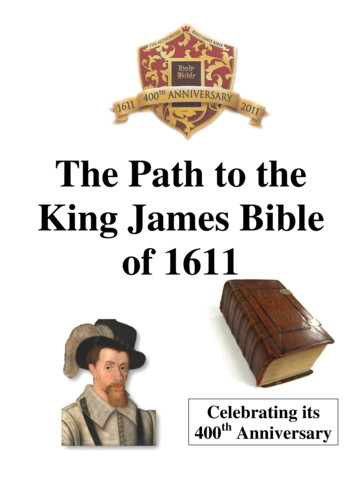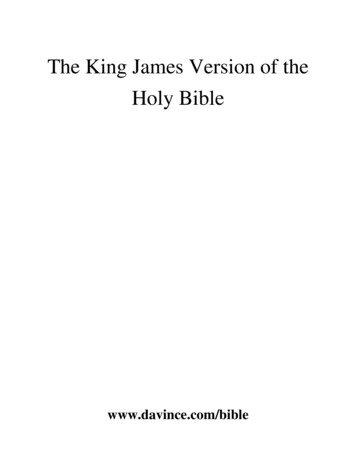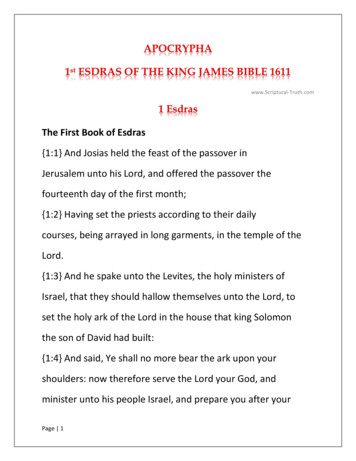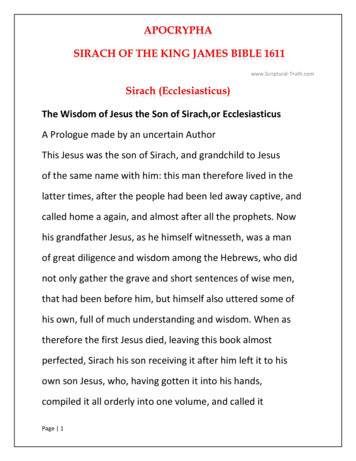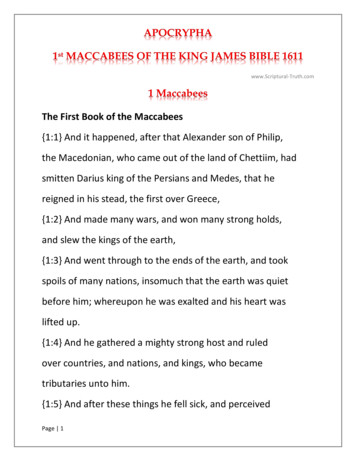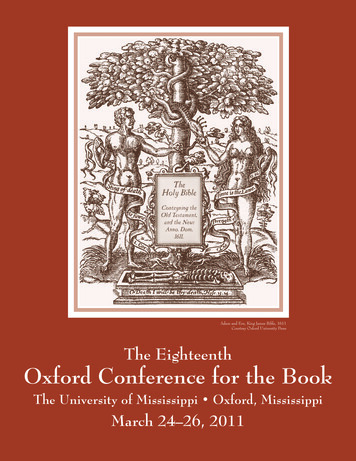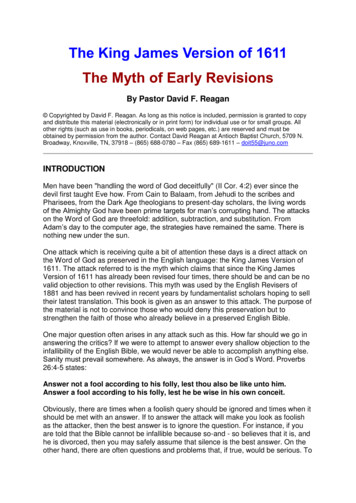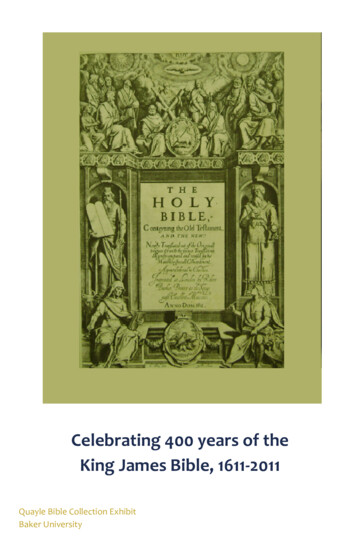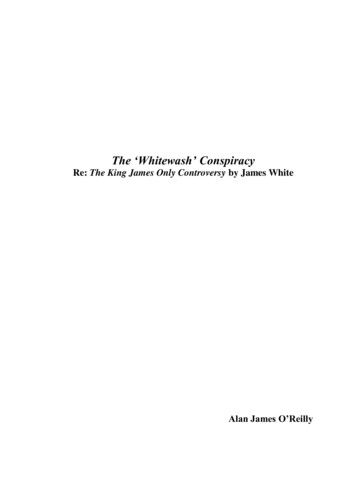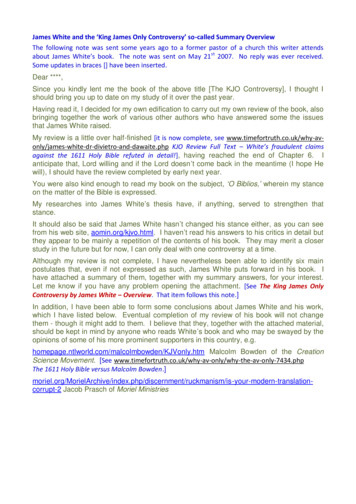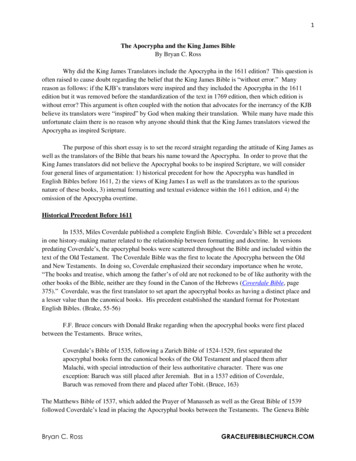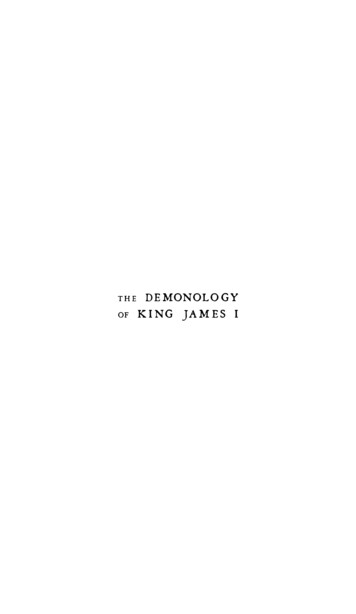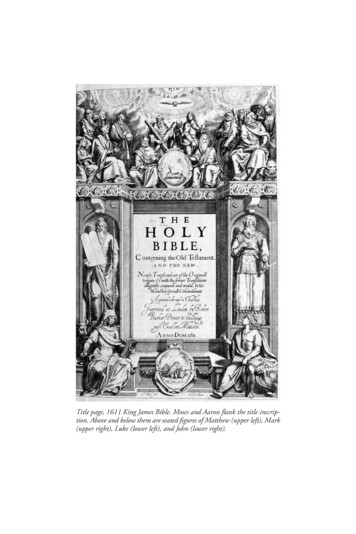
Transcription
Title page, 1611 King James Bible. Moses and Aaron flank the title inscription. Above and below them are seated figures of Matthew (upper left), Mark(upper right), Luke (lower left), and John (lower right).
Robert L. MilletA Latter-day SaintPerspective onBiblical InerrancyJoseph Smith explained, “We believe the Bible to be the word of God as far as itis translated correctly” (Articles of Faith 1:8). For some, particularly those whoare prone to be critical of the L atter-day Saints, this statement is prima facieevidence that Latter-day Saints do not value the Holy Bible—that we questionits relevance, that we do not adhere to its teachings, and that we do not feel thesame sense of reverent acceptance of it that we do for the scriptures of the Restoration. This chapter focuses on how we, as L atter-day Saints, maintain respect anddevotion for the Bible while acknowledging the reality of scribal errors throughthe centuries of transmission.Few things make Latter-day Saints more suspect, in the Christianworld at least, than their views of holy scripture. After spending the last fourteen years in interfaith relations, after reading andtalking about and listening to the perceptions of those critical ofMormonism, after scores of efforts to explain why Latter-day Saintsconsider themselves Christians, and after standing before tens ofthousands of people who pose poignant and probing questions, itoccurs to me that other than our ecclesiastical genealogy—the factthat we are not a part of Roman Catholicism, Eastern Orthodoxy,or Protestantism—perhaps the most frequently raised issue is JosephSmith’s view of the Bible and the need for continuing revelation,including an expanded canon of scripture. How do we dare claim tobe Christian, critics ask, if we deny the sufficiency, infallibility, and,for some more conservative groups, inerrancy of the book of books?
Robert L. MilletSu iciencyThe family of young Joseph Smith loved the Bible, and they readit regularly. It was, in fact, through pondering upon a biblical passage that Joseph began his quest to know the will of the Almighty.Most of his sermons, writings, and letters are laced with quotationsfrom or summaries of biblical passages and precepts from both theOld and New Testaments. Joseph once remarked that one can “seeGod’s own handwriting in the sacred volume: and he who reads itoftenest will like it best.”1 He believed the Bible represented God’sword to humanity, and he gloried in the truths and timeless lessonsit contained.As to the Bible’s sufficiency, to state that the Bible is the finalword of God—more specifically, the final written word of God—isto claim more for the Bible than it claims for itself. We are nowheregiven to understand that after the ascension of Jesus and the ministryand writings of first-century Apostles, revelations from Deity, whichcould eventually take the form of scripture and thus be added to thecanon, would cease. Thus Latter-day Saints would disagree with thefollowing excerpt from the 1978 Chicago Statement on Biblical Inerrancy: “The New Testament canon is . . . now closed, inasmuch as nonew apostolic witness to the historical Christ can now be borne. Nonew revelation (as distinct from Spirit-given understanding of existing revelation) will be given until Christ comes again.”2After speaking of how James 1:5–6 had made such a deep impression on his soul, Joseph wrote, “I reflected on it again and again,knowing that if any person needed wisdom from God, I did . . . forthe teachers of religion of the different sects understood the samepassages of scripture so differently as to destroy all confidence insettling the question by an appeal to the Bible” (Joseph Smith— History 1:12). Years later he stated:From what we can draw from the Scriptures relative to theteaching of heaven, we are induced to think that much124
A L atter-day Saint Perspective on Biblical Inerrancyinstruction has been given to man since the beginning whichwe do not possess now. This may not agree with the opinions of some of our friends who are bold to say that we haveeverything written in the Bible which God ever spoke to mansince the world began, and that if He had ever said anythingmore we should certainly have received it. . . . We have whatwe have, and the Bible contains what it does contain: butto say that God never said anything more to man than isthere recorded, would be saying at once that we have at lastreceived a revelation: for it must require one to advance thusfar, because it is nowhere said in that volume by the mouth ofGod, that He would not, after giving what is there contained,speak again; and if any man has found out for a fact that theBible contains all that God ever revealed to man he has ascertained it by an immediate revelation.3In an 1833 letter to his uncle Silas Smith, Joseph wrote:Seeing that the Lord has never given the world to understand by anything heretofore revealed that he had ceased forever to speak to his creatures when sought unto in a propermanner, why should it be thought a thing incredible thathe should be pleased to speak again in these last days fortheir salvation? Perhaps you may be surprised at this assertion that I should say “for the salvation of his creatures inthese last days” since we have already in our possession avast volume of his word [the Bible] which he has previouslygiven. But you will admit that the word spoken to Noah wasnot sufficient for Abraham. . . . Isaac, the promised seed,was not required to rest his hope upon the promises madeto his father Abraham, but was privileged with the assuranceof [God’s] approbation in the sight of Heaven by the directvoice of the Lord to him. . . .125
Robert L. MilletI have no doubt but that the holy prophets and apostlesand saints in ancient days were saved in the Kingdom ofGod. . . . I may believe that Enoch walked with God. . . . Imay believe that Abraham communed with God and conversed with angels. . . . I may believe that Elijah was takento Heaven in a chariot of fire with fiery horses. I may believethat the saints saw the Lord and conversed with him faceto face after his resurrection. I may believe that the HebrewChurch came to Mount Zion and unto the city of the livingGod, the Heavenly Jerusalem, and to an innumerable company of angels. I may believe that they looked into Eternityand saw the Judge of all, and Jesus the Mediator of the newcovenant; but will all this purchase an assurance for me, or waftme to the regions of Eternal day with my garments spotless, pure,and white? Or, must I not rather obtain for myself, by myown faith and diligence, in keeping the commandments ofthe Lord, an assurance of salvation for myself? And have Inot an equal privilege with the ancient saints? And will not theLord hear my prayers, and listen to my cries as soon as he everdid to theirs, if I come to him in the manner they did? Or ishe a respecter of persons?4Lee M. McDonald, an evangelical pastor, posed some fascinating questions relative to the present closed canon of Christianscripture. “The first question,” he wrote, “and the most importantone, is whether the church was right in perceiving the need fora closed canon of scriptures.” McDonald also asked, “Did such amove toward a closed canon of scriptures ultimately (and unconsciously) limit the presence and power of the Holy Spirit in thechurch? More precisely, does the recognition of absoluteness of thebiblical canon minimize the presence and activity of God in thechurch today? . . . On what biblical or historical grounds has theinspiration of God been limited to the written documents that the126
A L atter-day Saint Perspective on Biblical InerrancyChurch now calls its Bible?” McDonald poses other issues, but letme refer to his final question: “If the Spirit inspired only the written documents of the first century, does that mean that the sameSpirit does not speak today in the church about matters that are ofsignificant concern?”5I have my own set of questions to pose alongside McDonald:1. Who authorized the canon to be closed? Does notsuch a move inhibit one’s search for new truth, blockone’s openness to a later revelation from God, and, inessence, cause a people to be hardened and shut offfrom subsequent divine illumination? Nephi warned:“Therefore, wo be unto him that is at ease in Zion!Wo be unto him that crieth: All is well! . . . Yea, wo beunto him that saith: We have received, and we need nomore! And in fine, wo unto all those who tremble, andare angry because of the truth of God! For behold, hethat is built upon the rock receiveth it with gladness”(2 Nephi 28:24–25, 27–28).2. Who decided that the Bible was and forevermorewould be the final written word of God? Why wouldone suppose that the closing words of the Apocalypserepresented the “end of the prophets”?3. Latter-day Saints teach the same basic message thatJesus and Peter and Paul and John delivered to theunbelieving Jews of their day—that the heavens haveonce again been opened, that new light and knowledge have burst upon the earth, and that God haschosen to reveal himself through the ministry of hisBeloved Son and the Master’s ordained Apostles. Do Latter-day Saints find themselves today in a hauntingly reminiscent position relative to the continuingand ongoing mind and will of God?127
Robert L. MilletThe fact of the matter is that no branch of Christianity limitsitself entirely to the biblical text alone in making doctrinal decisions and in applying biblical principles. Roman Catholics turn toscripture, to church tradition, and to the magisterium for answers.Protestants, particularly evangelicals, turn to linguists and scripture scholars for their answers, as well as to post–New Testamentchurch councils and creeds. This seems, at least in my view, to bein violation of sola scriptura, the clarion call of the Reformation torely solely upon scripture itself. In fact, there is no final authorityon scriptural interpretation when differences arise, which of coursethey do.The Bible is a magnificent tool in the hands of God, but it is toooften used as a club or a weapon in the hands of men and women.For a long time now, the Bible has been used to settle disputes ofevery imaginable kind, even those that the prophets never intendedto settle. Creeds and biblical interpretations in the nineteenth century served as much to distinguish and divide as they did to informand unite.In allibilityWhat do people mean when they speak of biblical infallibility?The following are a few definitions of the word provided in theological dictionaries:“The characteristic of being incapable of failing to accomplisha predetermined purpose. . . . The Bible will not fail in its ultimatepurpose of revealing God and the way of salvation to humans. InRoman Catholic theology infallibility is also extended to the teaching of the church (magisterium or dogma) under the authorityof the pope as the chief teacher and earthly head of the body ofChrist.”6“Commitment to a belief that the Bible is completely trustworthy as a guide to salvation and the life of faith and will not fail toaccomplish its purpose. Some equate ‘inerrancy’ and ‘infallibility’;128
A L atter-day Saint Perspective on Biblical Inerrancyothers do not. For those who do not, infallibility does not necessarilyentail inerrancy.”7“A reference to the doctrine that the Bible is unfailing in itspurpose. In some usages of the term the Bible’s authority may berestricted to matters of salvation.”8“Infallible signifies the quality of neither misleading nor beingmisled and so safeguards in categorical terms the truth that HolyScripture is a sure, safe and reliable rule and guide in all matters.”9Many Latter-day Saints would have no difficulty with such definitions of biblical infallibility. From our perspective, the essentialmessage of the Bible is true and from God, and to that extent theBible is accomplishing its divine purpose on the earth. The NewTestament teaches powerfully and consistently that salvation is inChrist and that his is the only name by which salvation comes (seeActs 4:12; Philippians 2:9–11). It teaches of the absolute necessityof faith in Jesus Christ and all that that faith entails (repentance,baptism and rebirth, obedient discipleship). In fact, we do believethat the hand of God has been over the preservation of the biblicalmaterials such that what we have now is what the Almighty wouldhave us possess. In the words of Elder Bruce R. McConkie, “Wecannot avoid the conclusion that a divine providence is directingall things as they should be. This means that the Bible, as it now is,contains that portion of the Lord’s word” that the present world isprepared to receive.10Indeed, although Latter-day Saints do not believe that the Biblenow contains all that it once contained, the Bible is a remarkablebook of scripture, one that inspires, reproves, corrects, and instructs(see 2 Timothy 3:16). It is the word of God. Our task, according toPresident George Q. Cannon, is to engender faith in the Bible:As our duty is to create faith in the word of God in the mindof the young student, we scarcely think that object is bestattained by making the mistakes of translators [or transmitters]129
Robert L. Milletthe more prominent part of our teachings. Even children havetheir doubts, but it is not our business to encourage thosedoubts. Doubts never convert; negations seldom convince. . . The clause in the Articles of Faith regarding mistakes inthe translation of the Bible was never inserted to encourage usto spend our time in searching out and studying those errors,but to emphasize the idea that it is the truth and the truthonly that the Church of Jesus Christ of Latter-day Saintsaccepts, no matter where it is found.11In a revelation received in February 1831 that embraces “the lawof the Church,” the early Saints were instructed: “And again, theelders, priests and teachers of this church shall teach the principlesof my gospel, which are in the Bible and the Book of Mormon, in thewhich is the fulness of the gospel” (D&C 42:12; emphasis added). In1982 Elder McConkie explained to Church leaders, “Before we canwrite the gospel in our own book of life we must learn the gospelas it is written in the books of scripture. The Bible, the Book ofMormon, and the Doctrine and Covenants [and the Pearl of GreatPrice]—each of them individually and all of them collectively—containthe fulness of the everlasting gospel.”12InerrancyWhat, then, do scholars mean when they speak of scriptural inerrancy? Note the following definitions:“The idea that Scripture is completely free from error. It is generally agreed by all theologians who use the term that inerrancy atleast refers to the trustworthy and authoritative nature of Scriptureas God’s Word, which informs humankind of the need for and theway to salvation. Some theologians, however, affirm that the Bible isalso completely accurate in whatever it teaches about other subjects,such as science and history.”13130
A L atter-day Saint Perspective on Biblical Inerrancy“The theological conviction that the Bible is completely truthfuland accurate in every respect about all it affirms.”14“The variously interpreted teaching that the Bible contains noerror in that which it affirms.”15The Chicago Statement on Biblical Inerrancy makes a crucialcontribution to this concept: “Since God has nowhere promised aninerrant transmission of Scripture, it is necessary to affirm that onlythe autographic text of the original documents was inspired and tomaintain the need of textual criticism as a means of detecting anyslips that may have crept into the text in the course of its transmission.”16 This is the same position taken by the Evangelical Theological Society.17In recent years Bart Ehrman at the University of North Carolinaat Chapel Hill has stirred much controversy through such books asThe Orthodox Corruption of Scripture (Oxford, 1996), Lost Christianities (Oxford, 2005), Misquoting Jesus (HarperCollins, 2005),and Jesus Interrupted (HarperOne, 2009).18 Ehrman’s basic thrusthas been to demonstrate that scribal errors that occurred duringthe translation and transmission of New Testament manuscripts—whether intentional or unintentional—are so numerous that it is anintellectual and spiritual stretch for men and women today to havecomplete confidence in their present Bibles. In Misquoting Jesus, hewaxes personal for a bit and explains how he as an evangelical graduate student at Princeton lost his faith in the Bible. “I kept revertingto my basic question: how does it help us to say that the Bible is theinerrant word of God if in fact we don’t have the words that Godinerrantly inspired, but only the words copied by the scribes—sometimes correctly but sometimes (many times!) incorrectly? What goodis it to say that the autographs (i.e., the originals) were inspired?We don’t have the originals! We have only error-ridden copies, andthe vast majority of these are centuries removed from the originalsand different from them, evidently, in thousands of ways.” OnceEhrman agreed with one of his professors that perhaps “Mark just131
Robert L. MilletWhile Latter-day Saints do not believe the Bible to have come down in a perfectlyun tampered fashion, they do believe its teachings to be spiritually normative and eternally valuable. (Photo by Brent R. Nordgren.)made a mistake,” he says, “The floodgates opened. For if there couldbe one little, picayune mistake in Mark 2, maybe there could bemistakes in other places as well.” Having later discovered how manydifferent New Testament manuscripts there were (today some 5,700Greek manuscripts) and how many variants there were (200,000to 400,000), he put things into stark perspective: “There are morevariations among our manuscripts than there are words in the NewTestament.”19Christian apologists are quick to point out that Ehrman has losthis faith in Christianity and is therefore not a safe guide to follow insacred matters. Other apologists eagerly rush forward to affirm thatthere may indeed be as many as 400,000 New Testament manuscript variants but calmly reply that few if any of the variants aresubstantive and almost none have doctrinal implications.20 Manytimes I have asked Christian colleagues how they can be so certainthat the scribal errors are inconsequential. On several occasions, theresponse has been some variation of this theme: “Well, they couldn’tbe very significant, because God has all power, will not be thwarted132
A L atter-day Saint Perspective on Biblical Inerrancyin his divine purposes, and has surely seen to the preservation of theBible. The Bible is inerrant.” This is, of course, circular reasoning. Itis another way of saying, “I know the Bible is without error or flawbecause I know the Bible is inerrant.” Some Christian students havesimply replied, “Why would God allow such a thing to happen tohis holy word?” This question is, of course, related to the question ofwhy God would allow evil and suffering in the world, a topic, by theway, that Ehrman addresses in one of his latest works, God’s Problem:How the Bible Fails to Answer Our Most Important Question—Why WeSuffer (HarperCollins, 2008).It seems to me that the question is not whether there have beenscribal errors through the centuries—there have been. The questionis not whether the Bible is the word of God—it is. The question isnot whether the Bible can be relied upon with confidence if, in fact,there have been errors—it can. Timothy Paul Jones, in a reply toEhrman, has written: “Supposing that God did inspire the originalNew Testament writings and that he protected those writings fromerror—are the available copies of the New Testament manuscriptssufficiently accurate for us to grasp the truth that God intended inthe first century? I believe that the answer to this question is yes. Theancient manuscripts were not copied perfectly. Yet they were copied with enough accuracy for us to comprehend what the originalauthors intended.”21Jones’s position resembles the one held by The Church of JesusChrist of Latter-day Saints. We do not believe the Bible has to havecome down in perfectly untampered fashion, but we do believe itsteachings to be spiritually normative and eternally valuable. TheProphet Joseph Smith declared, “I believe the bible, as it ought tobe, as it came from the pen of the original writers.”22 And yet errorsin the Bible do not tarnish its image for Latter-day Saints. For thatmatter, while we accept the Book of Mormon, Doctrine and Covenants, and Pearl of Great Price as holy scripture, we would not rushto proclaim their inerrancy. The marvel is, in fact, the greater that133
Robert L. Milletan infinite and perfect being can work through finite and imperfecthumans to deliver his word to his children.Joseph Smith believed, to be sure, that the message of the Biblewas true and from God. We could say that he believed the Bible was“God’s word.” I am not so certain that he or modern Church leaders believed that every sentence recorded in the testaments containeda direct quotation or a transcription of divine direction. As RowanWilliams, the archbishop of Canterbury, writes: “Even on the mostconservative estimate of [the four Gospels’] accounts, there must havebeen episodes imperfectly seen or understood, episodes where directeyewitness evidence was lacking, along with partially conflicting testimonies. To grant this is simply to allow that the inspiration of theGospel narratives is not the gift to the writers of a miraculous God’seye view. If Jesus’ life is a truly human one, the witness to his life mustbe human as well, and human witness is seldom straightforward orcomprehensive.”23Aut orityThe Prophet Joseph Smith taught that it is the spirit of revelation within the one called of God that is the energizing force. Inmost instances, God places the thought into the mind or heartof the revelator, who then assumes the responsibility to clothethe oracle in language. Certainly there are times when a prophetrecords the words of God directly, but very often the “still smallvoice” (1 Kings 19:12) whispers to the prophet, who then speaksfor God. In short, when God chooses to speak through a person,that person does not become a mindless ventriloquist, an earthlysound system through which God can voice himself. Rather, theperson becomes enlightened and filled with intelligence or truth.“What makes us different from most other Christians,” ElderDallin H. Oaks explained, “in the way we read and use the Bibleand other scriptures is our belief in continuing revelation. For us,the scriptures are not the ultimate source of knowledge, but what134
A L atter-day Saint Perspective on Biblical Inerrancyprecedes the ultimate source. The ultimate knowledge comes byrevelation.”24Nothing could be clearer in the Old Testament, for example,than that many factors impacted the prophetic message—personality, experience, vocabulary, literary talent. The word of the Lord asspoken through I saiah is quite different from the word of the Lordas spoken through Luke, and both are different from that spokenby Jeremiah or Mark. Further, it is worth noting that stone, leaves,bark, skins, wood, metals, baked clay, and papyrus were all usedanciently to record inspired messages. Latter-day Saint concern withthe ancients is not the perfection with which such messages wererecorded but with the inspiration of the message. More specifically, Latter-day Saints are interested in the fact that the heavens wereopened to the ancients, that they had messages to record. In otherwords, knowing that God is the same yesterday, today, and forever(see Hebrews 13:8) and the fact that he spoke to them at all (howeverwell or poorly it may have been recorded) attests that he can speakto men and women in the here and now. After all, the Bible is onlyblack ink on white paper until the Spirit of God illuminates its truemeaning to us; if we have obtained that, there is little need to quibbleover the Bible’s suitability as a history or science text.For Latter-day Saints, the traditions of the past regarding scripture, revelation, and canon were altered dramatically by JosephSmith’s First Vision in 1820. God had spoken again and a “new dispensation” of truth was under way. The ninth article of faith states,“We believe all that God has revealed, all that He does now reveal,and we believe that He will yet reveal many great and importantthings pertaining to the Kingdom of God.” We feel deep gratitudefor the holy scriptures, but we do not worship scripture. Nor do wefeel it appropriate to “set up stakes and set bounds to the works andways of the Almighty.”25So often I encounter religious persons who state emphaticallythat their position is based entirely upon “the authority of scripture.”135
Robert L. MilletThe fact is, God is the source of any reputable religious authority. Inthe words of N. T. Wright, “The risen Jesus, at the end of Matthew’sgospel, does not say, ‘All authority in heaven and on earth is given tothe books you are all going to write,’ but ‘All authority in heaven andon earth is given to me.’” In other words, “scripture itself points—authoritatively, if it does indeed possess authority!—away from itselfand to the fact that final and true authority belongs to God himself,now delegated to Jesus Christ.”26ConclusionBelievers in the Bible are all about the business of reading scriptureand seeking to understand its meaning. I agree with Bart Ehrman’sstatement that “reading a text necessarily involves interpreting a text.I suppose when I started my studies I had a rather unsophisticatedview of reading: that the point of reading a text is simply to let thetext ‘speak for itself,’ to uncover the meaning inherent in its words.The reality, I came to see, is that meaning is not inherent and textsdo not speak for themselves. If texts could speak for themselves, theneveryone honestly and openly reading a text would agree on what thetext says. But interpretations of texts abound, and people in fact donot agree on what the texts mean.”27Randall Balmer at Barnard College, Columbia, has described thechallenge faced by many in the Christian world:Luther’s sentiments created a demand for Scriptures in thevernacular, and Protestants ever since have . . . insisted oninterpreting the Bible for themselves, forgetting most of thetime that they come to the text with their own set of culturalbiases and personal agendas.Underlying this insistence on individual interpretation isthe assumption . . . that the plainest, most evident reading ofthe text is the proper one. Everyone becomes his or her owntheologian. There is no longer any need to consult Augustine136
A L atter-day Saint Perspective on Biblical Inerrancyor Thomas Aquinas or Martin Luther about their understanding of various passages when you yourself are the final arbiterof what is the correct reading. This tendency, together withthe absence of any authority structure within Protestantism,has created a kind of theological free-for-all, as various individuals or groups insist that their reading of the Bible is theonly possible interpretation.28In speaking of the value of Church tradition in interpreting scripture, Scott Hahn, a man raised as an evangelical Protestant but wholater converted to Catholicism, wrote:When our nation’s founders gave us the Constitution, theydidn’t leave it at that. Can you imagine what we’d have todayif all they had given us was a document, as good as it is, alongwith a charge like, “May the spirit of Washington guide eachand every citizen”? We’d have anarchy—which is basicallywhat . . . Protestants do have when it comes to church unity.Instead, our founding fathers gave us something besides theConstitution; they gave us a government—made up of aPresident, Congress and a Supreme Court—all of which areneeded to administer and interpret the Constitution. And ifthat’s just enough to govern a country like ours, what wouldit take to govern a worldwide Church?29Richard L. Bushman has written, “At some level, Joseph’s revelations indicate a loss of trust in the Christian ministry.” He adds:For all their learning and their eloquence, the clergy could notbe trusted with the Bible. They did not understand what thebook meant. It was a record of revelations, and the ministry hadturned it into a handbook. The Bible had become a text to beinterpreted rather than an experience to be lived. In the process,137
Robert L. Milletthe power of the book was lost. . . . It was the power thereof thatJoseph and the other visionaries of his time sought to recover.Not getting it from the ministry, they looked for it themselves.To me, that is Joseph Smith’s significance for our time.He stood on the contested ground where the Enlightenmentand Christianity confronted one another, and his life posed thequestion, Do you believe God speaks? Joseph was swept aside, ofcourse, in the rush of ensuing intellectual battles and was disregarded by the champions of both great systems, but his missionwas to hold out for the reality of divine revelation and establishone small outpost where that principle survived. Joseph’s revelatory principle is not a single revelation serving for all time, asthe Christians of his day believed regarding the incarnation ofChrist, nor a mild sort of inspiration seeping into the minds ofall good people, but specific, ongoing directions from God to hispeople. At a time when the origins of Christianity were underassault by the forces of Enlightenment rationality, Joseph Smithreturned modern Christianity to its origins in revelation.”30I love the Bible. I treasure its teachings and delight in the spirit ofworship that accompanies its prayerful study. My belief in additionalscripture does not in any way detract from what I feel toward andlearn from the Holy Bible. Studying the Bible lifts my spirits, lightens my burdens, enlightens my mind, and motivates me to seek tolive a life of ho
Title page, 1611 King James Bible. Moses and Aaron flank the title inscrip-tion. Above and below them are seated figures of Matth
